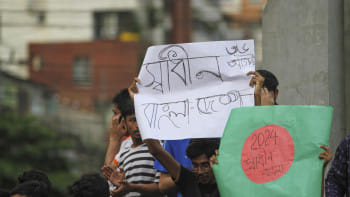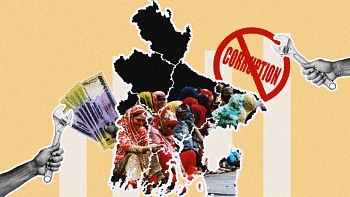How has the interim government fared so far?

Nearly three months have passed that the interim government (IG) has been in charge of a country devastated beyond comprehension. We the mere mortals, struggling to forget the nightmarish 15 years, can be forgiven for nurturing very high expectations from the new dispensation.
It will do us well to remember that the IG is not the caretaker government (CTG) of the past. It is very unique, given the circumstances in which it came to power—a popular youth-led uprising has validated not only the IG's assumption of power but has also, ipso facto, granted approval for any and all legal actions it undertakes to rectify the damage to the nation's institutions and agencies. The mutilation done to the nation would require more than run of the mill actions or traditional approach.
In passing it should be stressed that raising the issue of Hasina's resignation at this point in time is out of place, some may see this as being ulteriorly motivated, and reeking of conspiracy.
It is of no consequence whether a person who assumed power in a dubious manner, was deposed through a popular uprising—there can be no greater mandate than this—and sought exile of their own volition, has tendered an official letter of resignation. We must admit that the president's recent remarks regarding this have mystified us.
The various reform committee gives us a good idea of the sectoral reforms the IG wants to undertake. Unique situation requires unique response that may not necessarily conform to the normal methods and means of administering a country.
But while the IG goes about fixing things, it should keep the people informed about its policies and plan of action for rectification. The IG should keep in mind that although it is not bound by any timeframe and its framework of reference is very wide, its time limit is also not open-ended. And a "reasonable" timeframe is open to various interpretations. What the IG is doing should also be visible.
The various reform committee gives us a good idea of the sectoral reforms the IG wants to undertake. Unique situation requires unique response that may not necessarily conform to the normal methods and means of administering a country.
The first thing that still needs to be fully addressed is the administration, which seems to be influenced by the lingering presence of the Awami League. Reportedly, many beneficiaries of the past regime continue in important appointments. The longer they stay in the administration the more are the risks they pose to the successful implementation of the IG's reform plans. The significance of the manufactured unrest in the RMG sector, sabotage of oil tankers, and various demands from different professional groups are well-orchestrated actions to nip the plans of the IG in the bud.
Apparently, it would seem that the administration is not moving fast enough for some quarter's liking, and a feature post-revolution is the regime of intimidation and coercion imposed on certain quarters. While that is understandable under the circumstances, making haste while sorting out the muck of the last 15 years may be counterproductive.
The public has certain expectations as well as grievances, and some of these are manifested in the student outburst, demonstrated in their siege of the High Court for removal of judges appointed during the Hasina regime where personal fealty triumphed over qualification and merit. The latest outburst is against the person in Bangabhaban for reasons mentioned.
One of the gripes the students have, and justifiably so, is the continuation of some senior bureaucrats who thrived under the Hasina regime, and who were complicit in the destruction of the state institutions and misuse of the state agencies for partisan gains. This goes for all sectors.
The education sector was a target of the students too. But witch-hunting is not the answer. Admittedly, the public universities were caderised from the vice chancellor down to the junior most lecturer. Most of them did not meet the minimum requirements of the post. One might say that it was a long-term plan to destroy the backbone of the nation by destroying the education sector.
It would also seem that the process of accountability is not moving fast enough. One hears the question "Where have all the crooks gone, and how?" Indeed, one may ask, once again, where have all the crooks gone? And by crooks, I mean all those that sought sanctuary inside the safety of the cantonments across the country after the student-led revolution that has been anointed with the very appropriate appellation of Monsoon Revolution, and many others who made good their escape quite a few days after the assumption of office of the IG. In fact, there is a general suspicion that the beneficiaries of the previous government may still be calling the shots.
A passing reference was made to this subject in one of my previous columns, but time has come to accord the issue more than a cursory glance. It is my distinct impression that the matter has been deliberately swept under the carpet hoping that, Bangalee memory being short, the matter would be forgotten. Well, not so soon.
A few questions need to be answered by the relevant individuals in positions of responsibility. Feigning ignorance will not sit well with the common man, who feels that allowing those responsible for bringing so much misery to the people—through wanton loot and plunder, siphoning billions out of the country, and particularly those directly responsible for the deaths of a thousand and the maiming of several times more—soils the blood of the martyrs. They must be held accountable.
Of the 17 crore Bangladeshis, only 600 or so sought refuge inside the military establishments. Among them were politicians and senior members of the law enforcing agencies. The question is why. They must have done something wrong that they feared would incur public wrath. In fact, these were the people who would have left the country sooner but somehow couldn't. Some of their more clever and smarter colleagues had abandoned the Awami League boat no sooner than they realised that it had started taking in water.
In fact, abandoning the followers and leaving the country furtively for safer places during hard times has been the hallmark of the party leadership. History will bear out my comments. Therefore, to see the leader living up to the party tradition after August 5 was not a surprise.
My question is: in the future, will highly secured places within the country be used as sanctuaries for those responsible for killing democracy, looting public wealth, and committing the kinds of misdeeds that those seeking protection in the cantonments are alleged to have committed? Additionally, we are still at a loss to explain how many of these individuals managed to leave the country and who guaranteed them a safe exit.
The ultimate goal is to hold a participatory all-inclusive and acceptable election. Having said that, holding elections without fixing the systemic aberrations would take us back to square one. That would denigrate the sacrifice of the martyrs of the Monsoon Revolution. And it shall not be allowed to happen.
Brig Gen Shahedul Anam Khan, ndc, psc (retd) is a former associate editor of The Daily Star.
Views expressed in this article are the author's own.
Follow The Daily Star Opinion on Facebook for the latest opinions, commentaries and analyses by experts and professionals. To contribute your article or letter to The Daily Star Opinion, see our guidelines for submission.

 For all latest news, follow The Daily Star's Google News channel.
For all latest news, follow The Daily Star's Google News channel. 










Comments